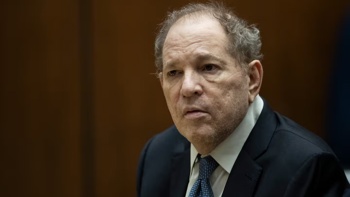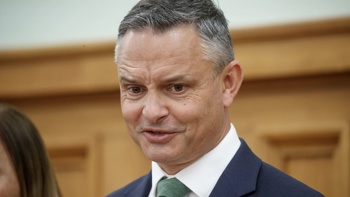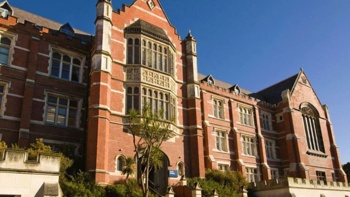Russia's initial military campaign in Ukraine has been "defeated", and the war is now entering a "dangerous" new phase, in the form of a "violent and bloody" stalemate.
That is the assessment of experts from the Institute for the Study of War, a US-based thinktank. They believe the likelihood of Russia meeting the objectives of its invasion is now "very unlikely".
Russia appears to have abandoned its plans to attack Odesa and encircle Kyiv. Instead, it is now moving to "set the conditions for an expanded artillery and missile bombardment" of the Ukrainian capital.
"Stalemate is not armistice or ceasefire. It is a condition in war in which each side conducts offensive operations that do not fundamentally alter the situation. Those operations can be very damaging and cause enormous casualties," the ISW says.
"If the war in Ukraine settles into a stalemate condition, Russian forces will continue to bomb and bombard Ukrainian cities, devastating them and killing civilians, even as Ukrainian forces impose losses on Russian attackers and conduct counterattacks of their own.
"The Russians could hope to break Ukrainians' will to continue fighting under such circumstances ... Ukraine's defeat of the initial Russian campaign may therefore set conditions for a devastating protraction of the conflict and a dangerous new period testing the resolve of Ukraine and the West."
War entering 'dangerous new period'
New analysis from the Institute for the Study of War, a US-based thinktank, says Ukraine has "defeated the initial Russian campaign of this war".
"That campaign aimed to conduct airborne and mechanised operations to seize Kyiv, Kharkiv, Odesa and other major Ukrainian cities to force a change of government," experts Frederick Kagan, George Barros and Kateryna Stepanenko write.
"That campaign has culminated. Russian forces continue to make limited advances in some parts of the theatre, but are very unlikely to be able to seize their objectives in this way.
"The doctrinally sound Russian response to this situation would be to end this campaign, accept a possibly lengthy operational pause, develop the plan for a new campaign, build up resources for that new campaign, and launch it when the resources and other conditions are ready. The Russian military has not yet adopted this approach.
"It is instead continuing to feed small collections of reinforcements into an ongoing effort to keep the current campaign alive. We assess that that effort will fail."
Even the fall of Mariupol, a key focus of Russian forces in the south at the moment, would be "unlikely to free up enough Russian combat power" to have a large influence on the outcome of the initial campaign.
"Had the Russians taken Mariupol quickly or with relatively few losses, they would likely have been able to move enough combat power west towards Zaporizhiya and Dnipro to threaten those cities," they say.
"The protracted siege of Mariupol is seriously weakening Russian forces on that axis, however ... the block-by-block fighting is costing the Russians time, initiative and combat power. If and when Mariupol ultimately falls, the Russian forces now besieging it may not be strong enough to change the course of the campaign dramatically by attacking to the west."
Russia appears to have "abandoned" its plans to attack Odesa, and has "likely abandoned" its plan to encircle Kyiv. Instead, the Russians now intend to "set conditions for an expanded artillery and missile bombardment" of the capital.
The upshot of all this is that the war is heading for a "very violent and bloody" stalemate.
"The culmination of the initial Russian campaign is creating conditions of stalemate throughout most of Ukraine," say the ISW experts.
"Stalemate will likely be very violent and bloody, especially if it protracts. Stalemate is not armistice or ceasefire. It is a condition in war in which each side conducts offensive operations that do not fundamentally alter the situation. Those operations can be very damaging and cause enormous casualties.
"If the war in Ukraine settles into a stalemate condition, Russian forces will continue to bomb and bombard Ukrainian cities, devastating them and killing civilians, even as Ukrainian forces impose losses on Russian attackers and conduct counterattacks of their own.
"The Russians could hope to break Ukrainians' will to continue fighting under such circumstances ... Ukraine's defeat of the initial Russian campaign may therefore set conditions for a devastating protraction of the conflict and a dangerous new period testing the resolve of Ukraine and the West."
Russians push deeper into Mariupol
Russian forces pushed deeper into Ukraine's besieged and battered port city of Mariupol on Saturday, where heavy fighting shut down a major steel plant and local authorities pleaded for more Western help.
The fall of Mariupol, the scene of some of the war's worst suffering, would mark a major battlefield advance for the Russians, who are largely bogged down outside major cities more than three weeks into the biggest land invasion in Europe since World War II.
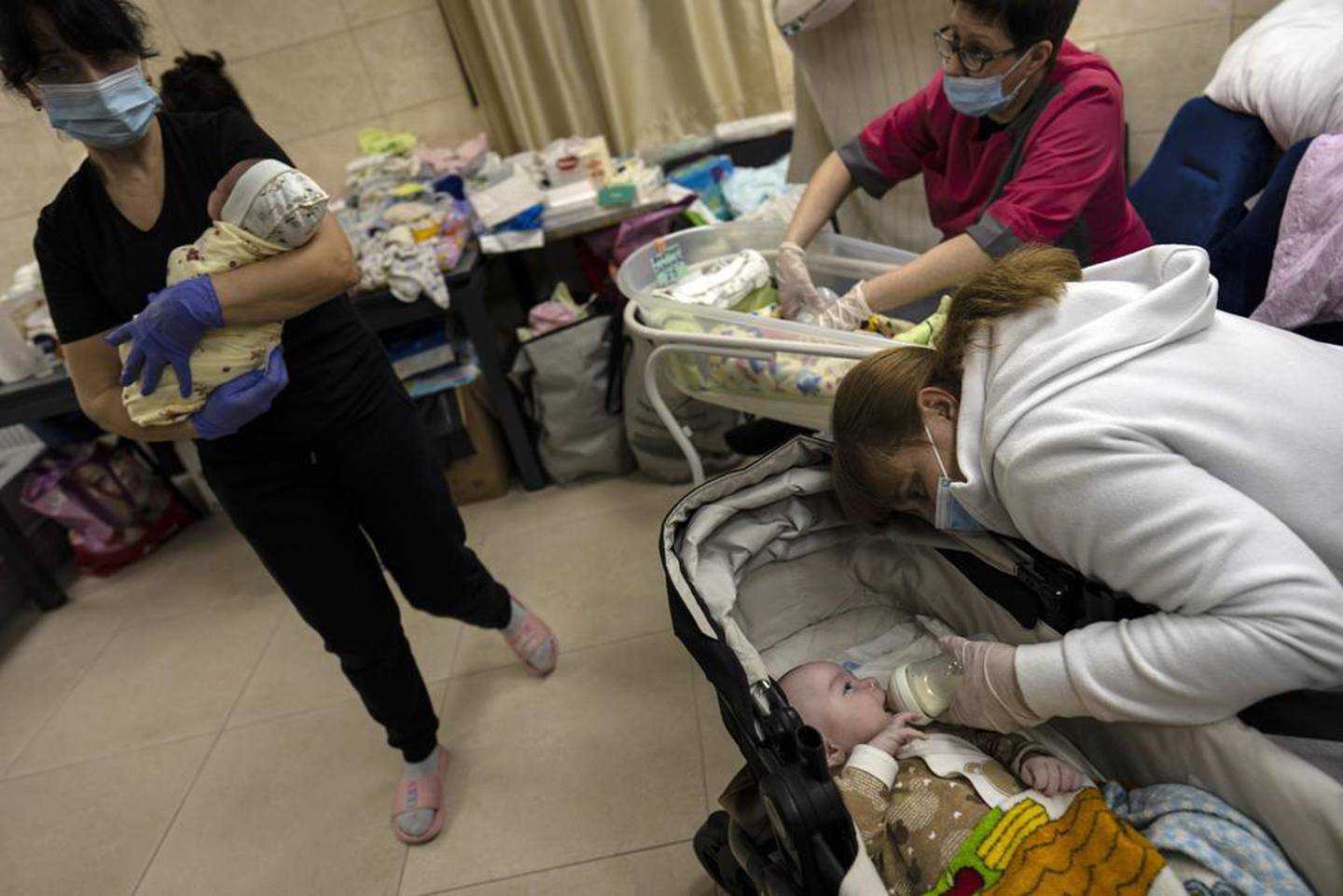
A worker feeds a newborn baby in a basement converted into a nursery in Kyiv, Ukraine. Photo / AP
"Children, elderly people are dying. The city is destroyed and it is wiped off the face of the earth," Mariupol police officer Michail Vershnin said from a rubble-strewn street in a video addressed to Western leaders that was authenticated by The Associated Press.
Russian forces have already cut the city off from the Sea of Azov, and its fall would link Crimea, which Russia annexed in 2014, to territories controlled by Moscow-backed separatists in the east. It would mark a rare advance in the face of fierce Ukrainian resistance that has dashed Russia's hopes for a quick victory and galvanised the West.
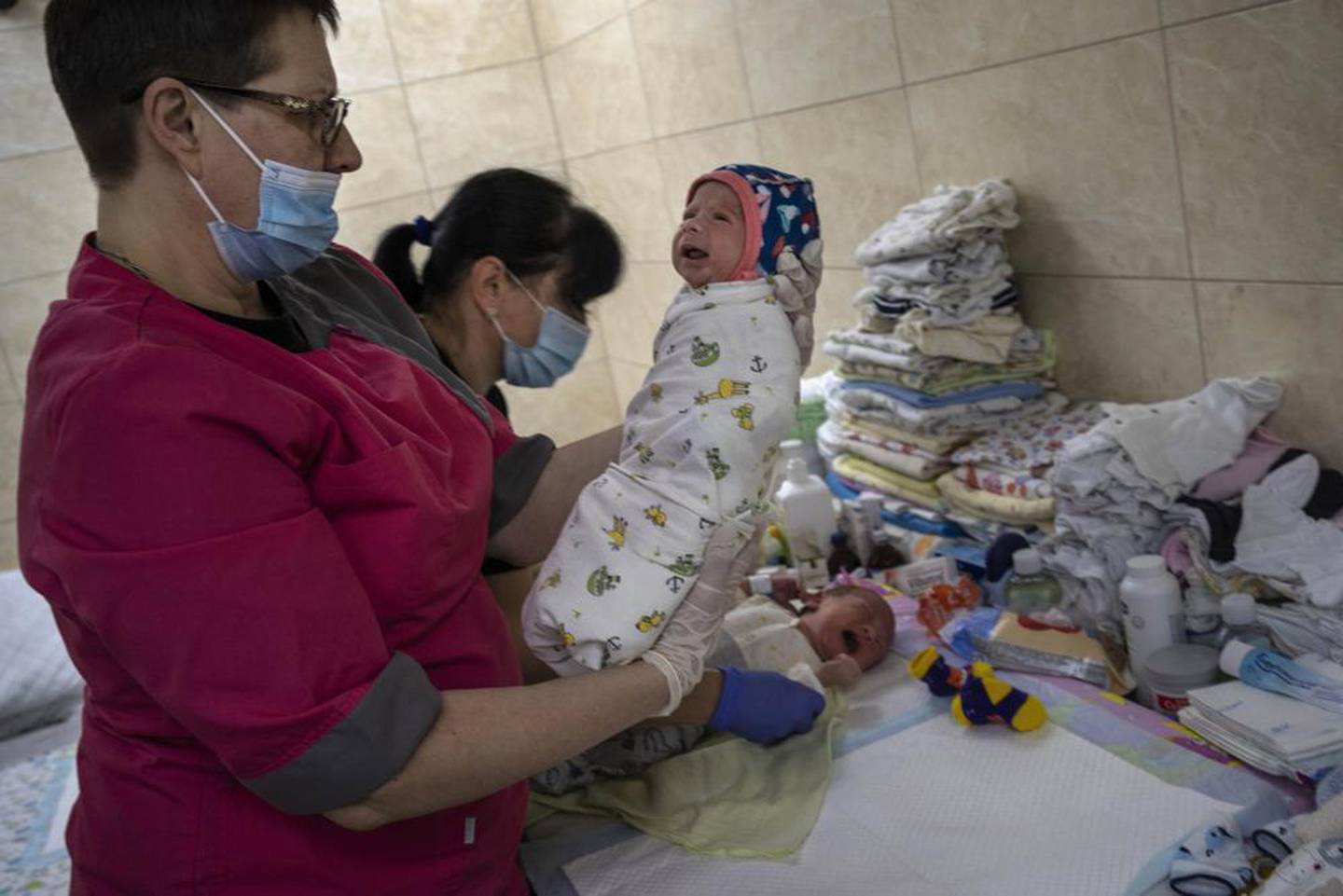
A nanny carries a baby to the crib after changing his diaper in a nursery in Kyiv, Ukraine. Photo / AP
Ukrainian and Russian forces battled over the Azovstal steel plant in Mariupol, Vadym Denysenko, adviser to Ukraine's interior minister, said on Saturday.
"One of the largest metallurgical plants in Europe is actually being destroyed," Denysenko said in televised remarks.
Oleksiy Arestovych, an adviser to Ukraine's president, said the nearest forces that could assist Mariupol's defenders were already struggling against "the overwhelming force of the enemy" or at least 100km away.
"There is currently no military solution to Mariupol," he said late Friday. "That is not only my opinion, that is the opinion of the military."
Ukrainian President Volodomir Zelenskyy has remained defiant, appearing in a video early Saturday shot on the streets of the capital, Kyiv, to denounce a huge Friday rally in Moscow that Russian President Vladimir Putin attended.
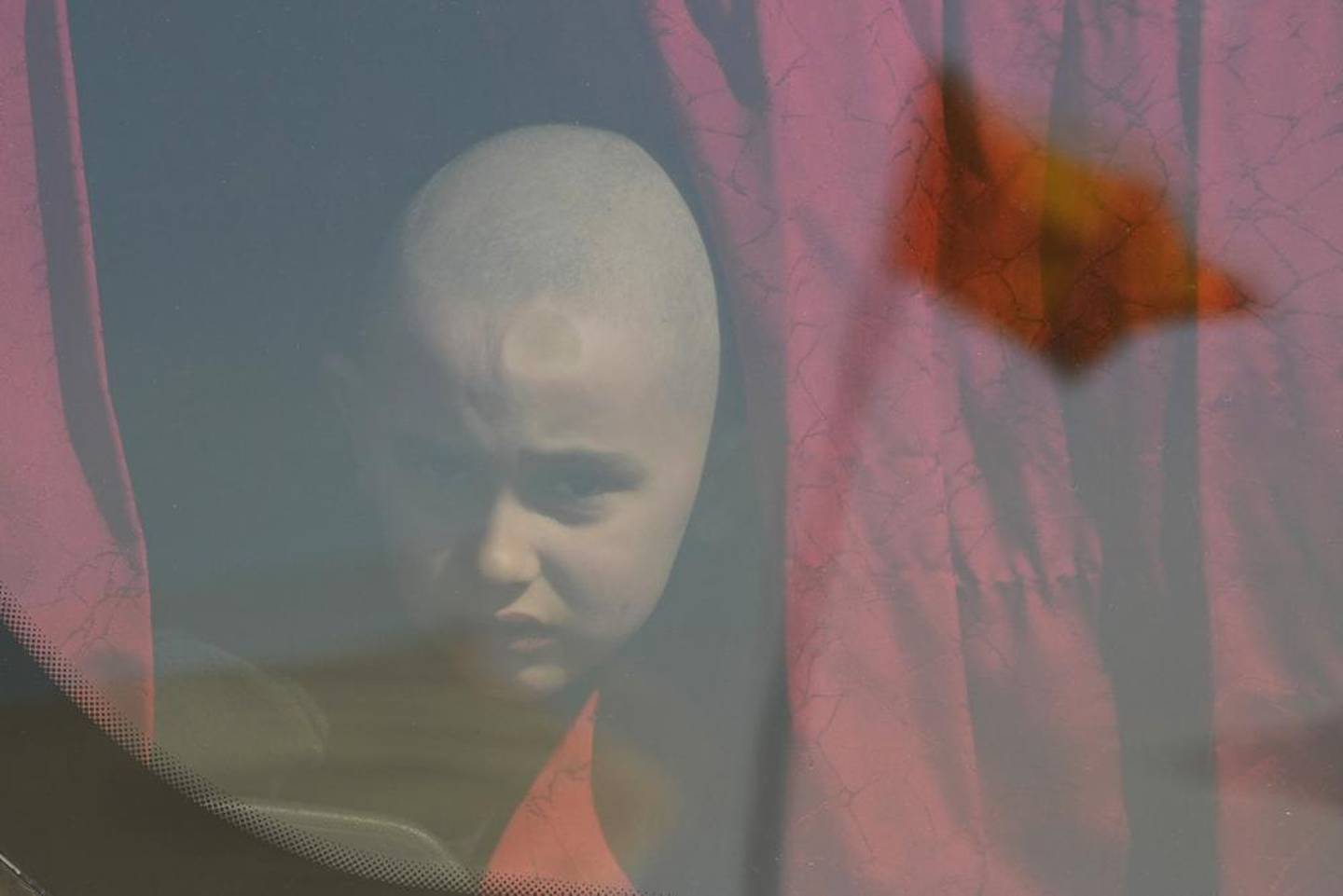
A refugee child looks out from a bus after fleeing the war from neighbouring Ukraine. Photo / AP
Zelenskyy said Russia is trying to starve Ukraine's cities into submission but warned that continuing the invasion would exact a heavy toll on Russia. He also repeated his call for Putin to meet with him to prevent more bloodshed.
"The time has come to restore territorial integrity and justice for Ukraine. Otherwise, Russia's costs will be so high that you will not be able to rise again for several generations," he said.
Putin lavished praise on his country's military during the rally, which took place on the anniversary of Russia's 2014 annexation of Crimea. The event included patriotic songs such as "Made in the USSR," with its opening line of "Ukraine and Crimea, Belarus and Moldova, it's all my country."
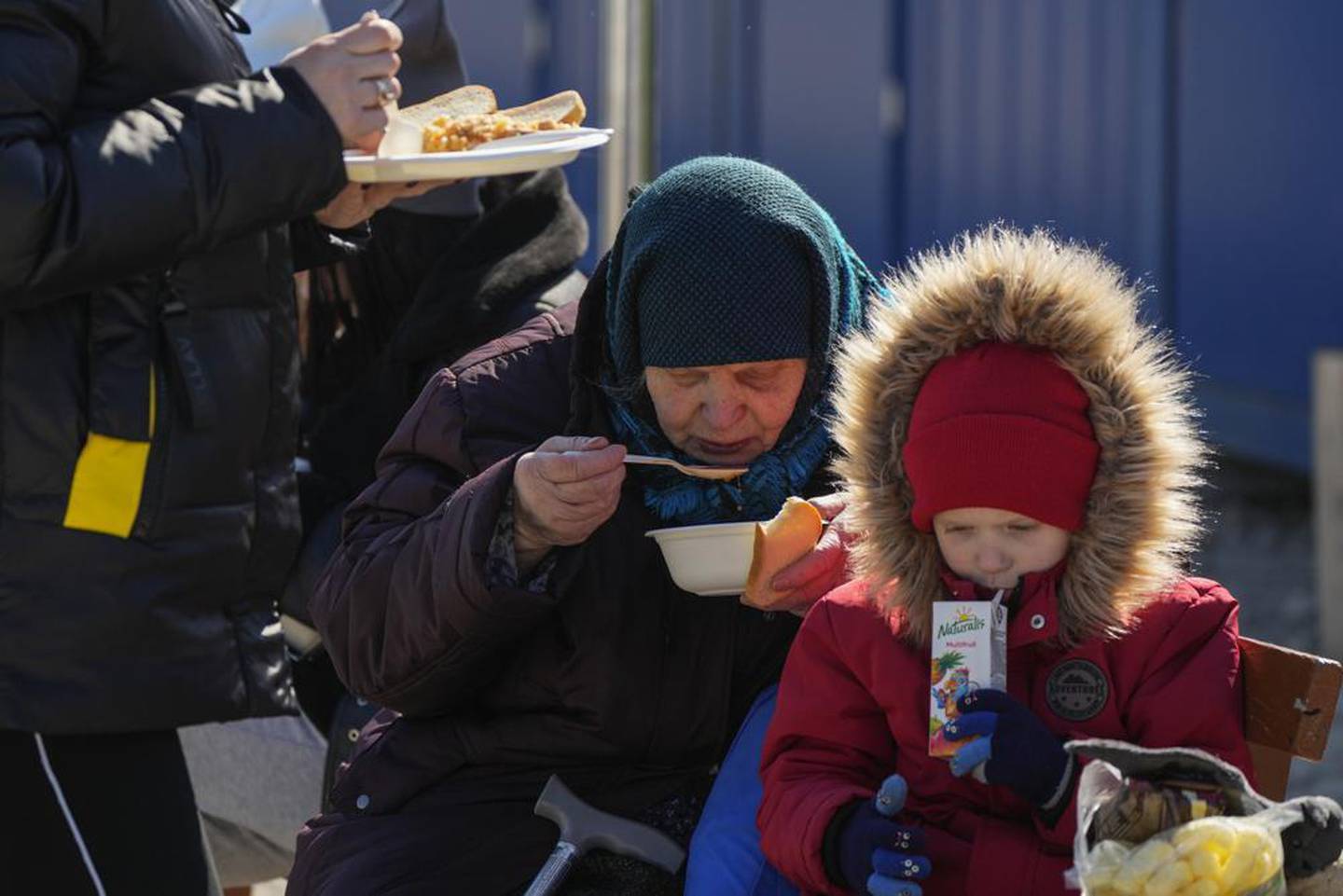
A refugee from the Ukrainian city of Mykolaiv, Ekaterina Mosha, 82, has a meal with her grandson Dmitrii, 3, after fleeing the war from neighbouring Ukraine. Photo / AP
"We have not had unity like this for a long time," Putin told the cheering crowd.
The rally took place as Russia has faced heavier-than-expected losses on the battlefield and increasingly authoritarian rule at home, where Russian police have detained thousands of antiwar protesters.
Estimates of Russian deaths vary widely, but even conservative figures are in the low thousands. Russia had 64 deaths in five days of fighting during its 2008 war with Georgia. It lost about 15,000 in Afghanistan over 10 years, and more than 11,000 over years of fighting in Chechnya.
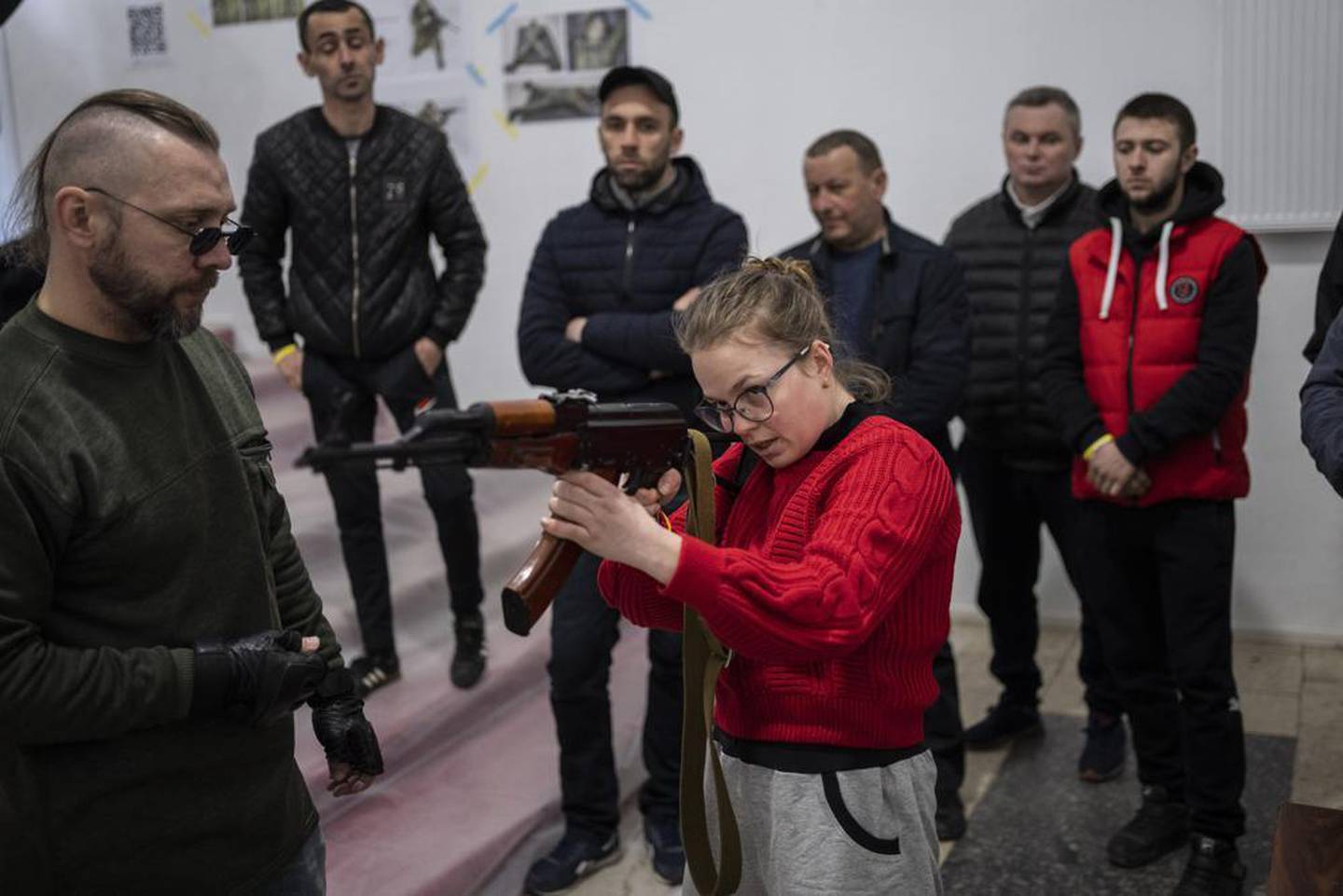
Ukrainian civilians receive weapons training in Lviv, Western Ukraine. Photo / AP
The Russian military said on Saturday it used its latest hypersonic missile for the first time in combat. Major General Igor Konashenkov said Kinzhal missiles destroyed an underground warehouse storing Ukrainian missiles and aviation ammunition in the western Ivano-Frankivsk region of Ukraine.
Russia has said the Kinzhal, carried by MiG-31 fighter jets, has a range of up to 2000km and flies at 10 times the speed of sound.
Pentagon press secretary John Kirby said on Saturday the US couldn't confirm the Russians used a hypersonic missile in the attack.
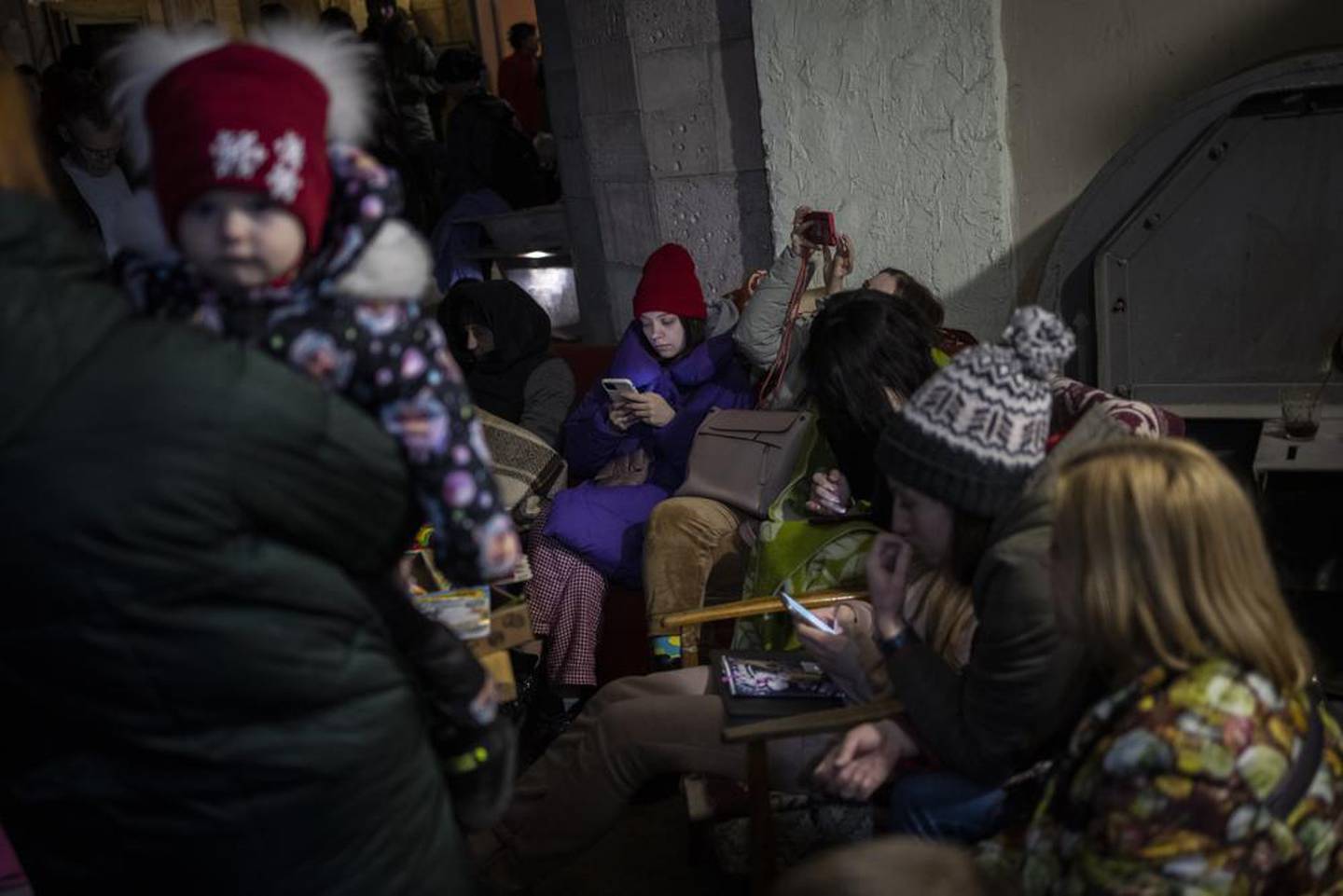
People sit in a basement, used as a bomb shelter, during an air raid in Lviv, Western Ukraine. Photo / AP
Meanwhile, fighting raged on multiple fronts in Ukraine. UN bodies have confirmed more than 847 civilian deaths since the war began, though they concede the actual toll is likely much higher. The UN says more than 3.3 million people have fled Ukraine as refugees.
Waiting to board a bus at a triage center near the Moldova-Ukraine border on Saturday, a Ukrainian woman named Irina said she decided to leave home in Mykolaiv this week after a loud explosion shook the walls, waking her young daughter.
"Can you imagine the fear I had, not for me but for my child?" said Irina, who didn't provide her last name. "So we made decision to arrive here, but I don't know where we are going, where we'll stay."
The northwestern Kyiv suburbs of Bucha, Hostomel, Irpin and Moshchun were under fire on Saturday, the Kyiv regional administration reported. It said Slavutich, located 165km north of the capital, was "completely isolated."
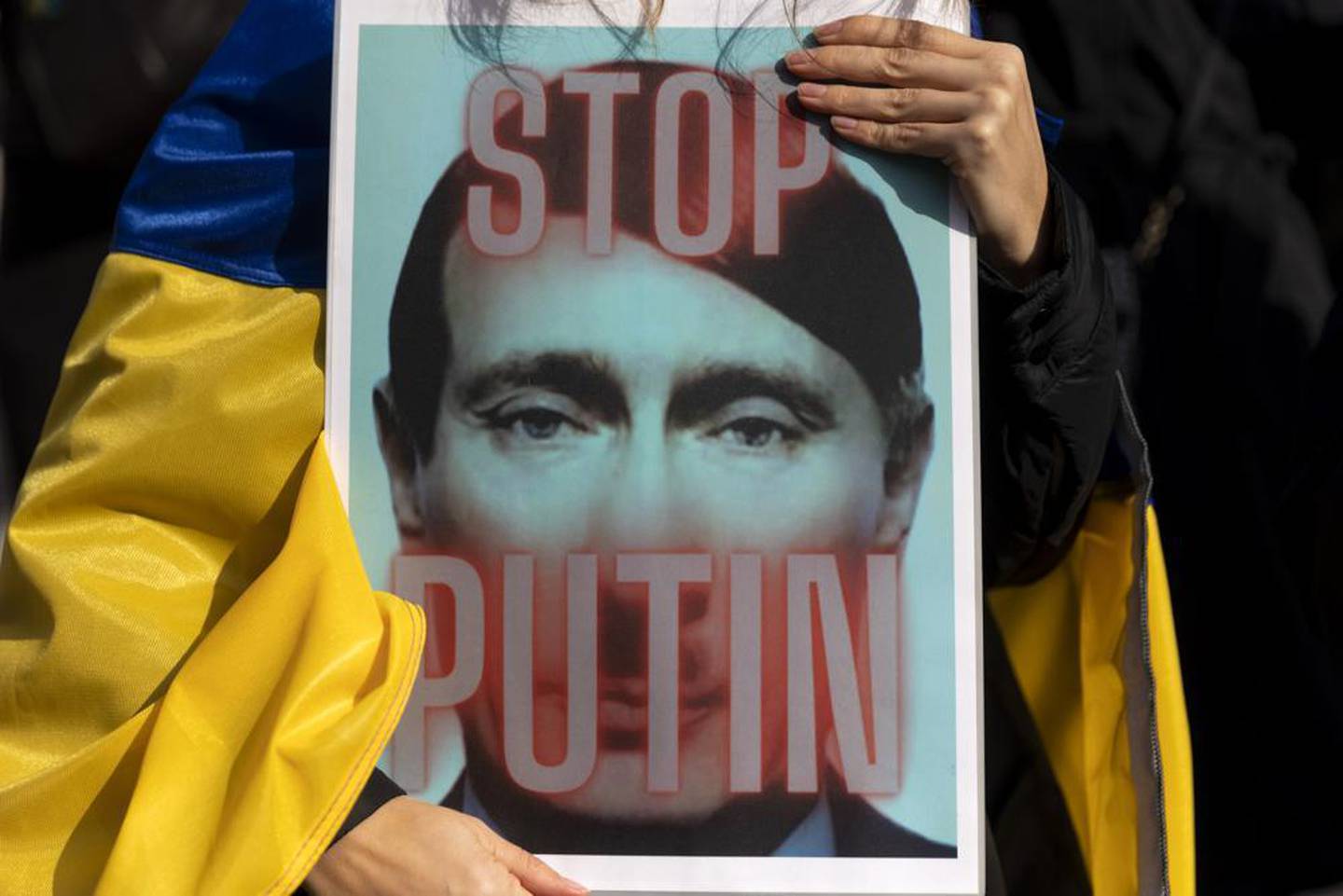
A woman holds a placard during a rally against the Russian invasion of Ukraine, at central Syntagma square, in Athens. Photo / AP
Police of the Kyiv region said seven people were killed and five were wounded in a mortar attack on Friday in Makariv, a town roughly 50km west of the capital. They said the attack destroyed homes and damaged other buildings.
Ukrainian and Russian officials agreed to establish 10 humanitarian corridors for bringing aid in and residents out of besieged cities — one from Mariupol and several around Kyiv and in the eastern Luhansk region, Ukrainian Deputy Prime Minister Iryna Vereshchuk said Saturday.
She also announced plans to deliver humanitarian aid to the southern city of Kherson, which Russia seized early in the war.
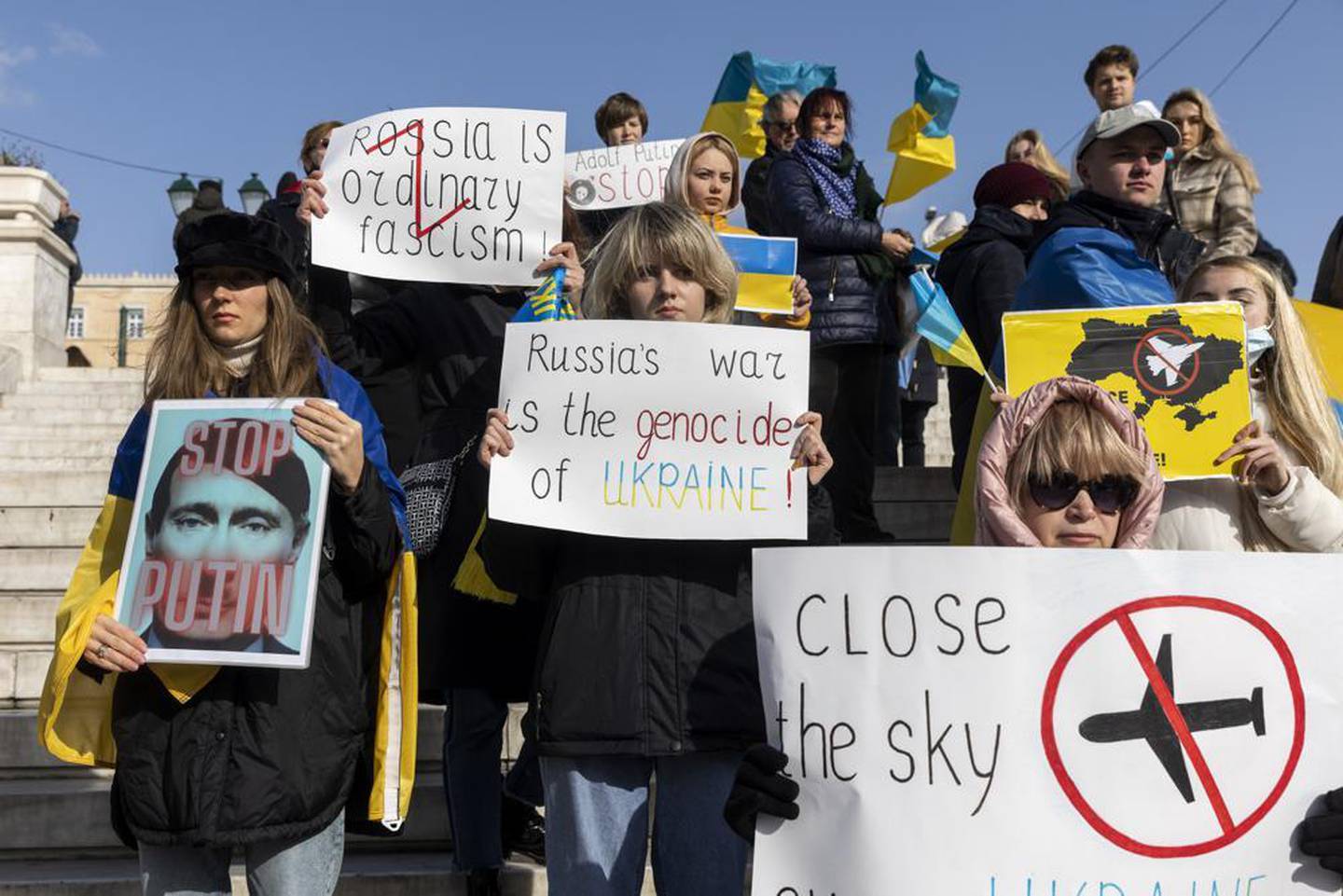
Protesters hold placards during a rally against the Russian invasion of Ukraine, at central Syntagma square, in Athens. Photo / AP
Ukraine and Russia have held several rounds of negotiations aimed at ending the conflict but remain divided over several issues. Russia is pressing for its neighbour's demilitarisation and Kyiv is demanding security guarantees.
In a call with German Chancellor Olaf Scholz on Friday, Putin said Ukraine was trying to "drag the negotiations by making a series of new, unrealistic proposals," according to the Kremlin.
British Foreign Secretary Liz Truss, meanwhile, accused Putin of using the talks as a "smokescreen" while his forces regroup. "We don't see any serious withdrawal of Russian troops or any serious proposals on the table," she told the Times of London.
The British Department of Defence said in its latest intelligence assessment that the Kremlin "has been surprised by the scale and ferocity of Ukrainian resistance" and "is now pursuing a strategy of attrition" that is likely to involve indiscriminate attacks.
US Defence Secretary Lloyd Austin, during a Saturday visit to Nato ally Bulgaria, said the Russian invasion had "stalled on a number of fronts" but the US had not yet seen signs Putin was deploying additional forces.
Around Ukraine, hospitals, schools and buildings where people sought safety have been attacked.
At least 130 people survived the Wednesday bombing of a Mariupol theatre that was being used a shelter, but another 1300 were believed to be still inside, Ludmyla Denisova, the Ukrainian Parliament's human rights commissioner, said on Friday.
"We pray that they will all be alive, but so far there is no information about them," Denisova told Ukrainian television.
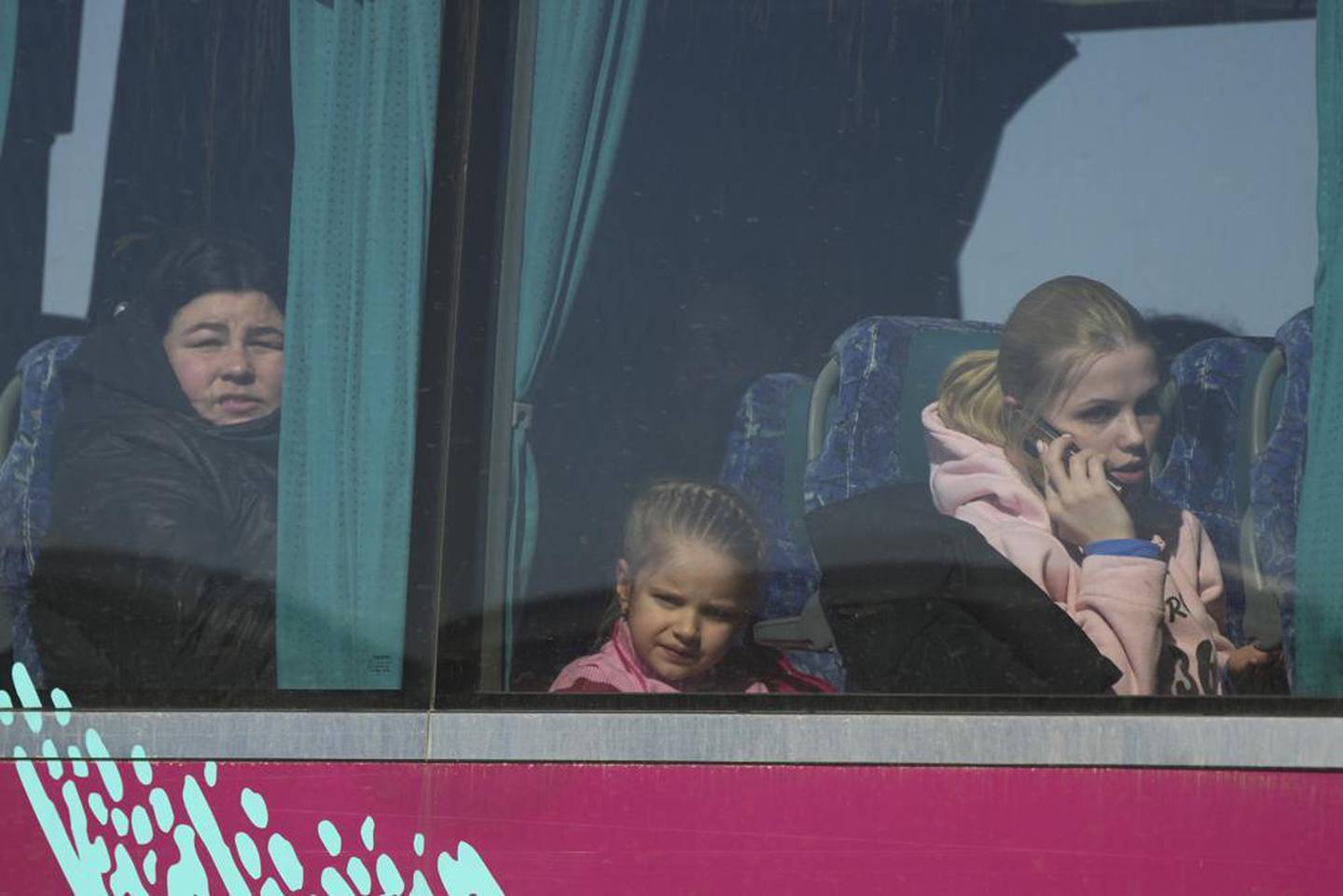
Refugees look out from a bus after fleeing the war from neighbouring Ukraine. Photo / AP
Satellite images from Maxar Technologies showed a long line of cars leaving Mariupol as people tried to evacuate. Zelenskyy said more than 9000 people were able to leave on Friday along a route that leads 227km away to the city of Zaporizhzhia — which is also under attack.
The governor of southern Ukraine's Zaporizhzhia region, Oleksandr Starukh, announced a 38-hour curfew after two missile strikes on Zaporizhzhia's suburbs killed nine people Friday.
Russian forces have fired on eight cities and villages in the eastern Donetsk region in the past 24 hours, including Mariupol, Ukraine's national police said on Saturday.
The attacks with rockets and heavy artillery killed and wounded dozens of civilians, and damaged at least 37 residential buildings and facilities, including a school, a museum and a shopping centre, it said.
In the western city of Lviv, Ukraine's cultural capital, which was hit by Russian missiles on Friday, military veterans were training dozens of civilians on how to handle firearms and grenades.
"It's hard, because I have really weak hands, but I can manage it," said one trainee, 22-year-old Katarina Ishchenko.
- AP
Take your Radio, Podcasts and Music with you






